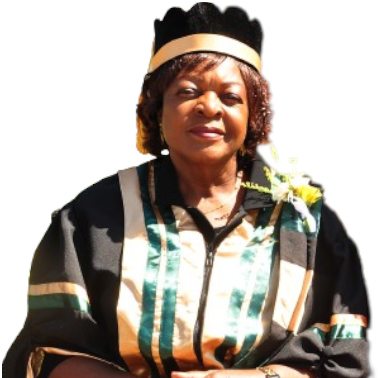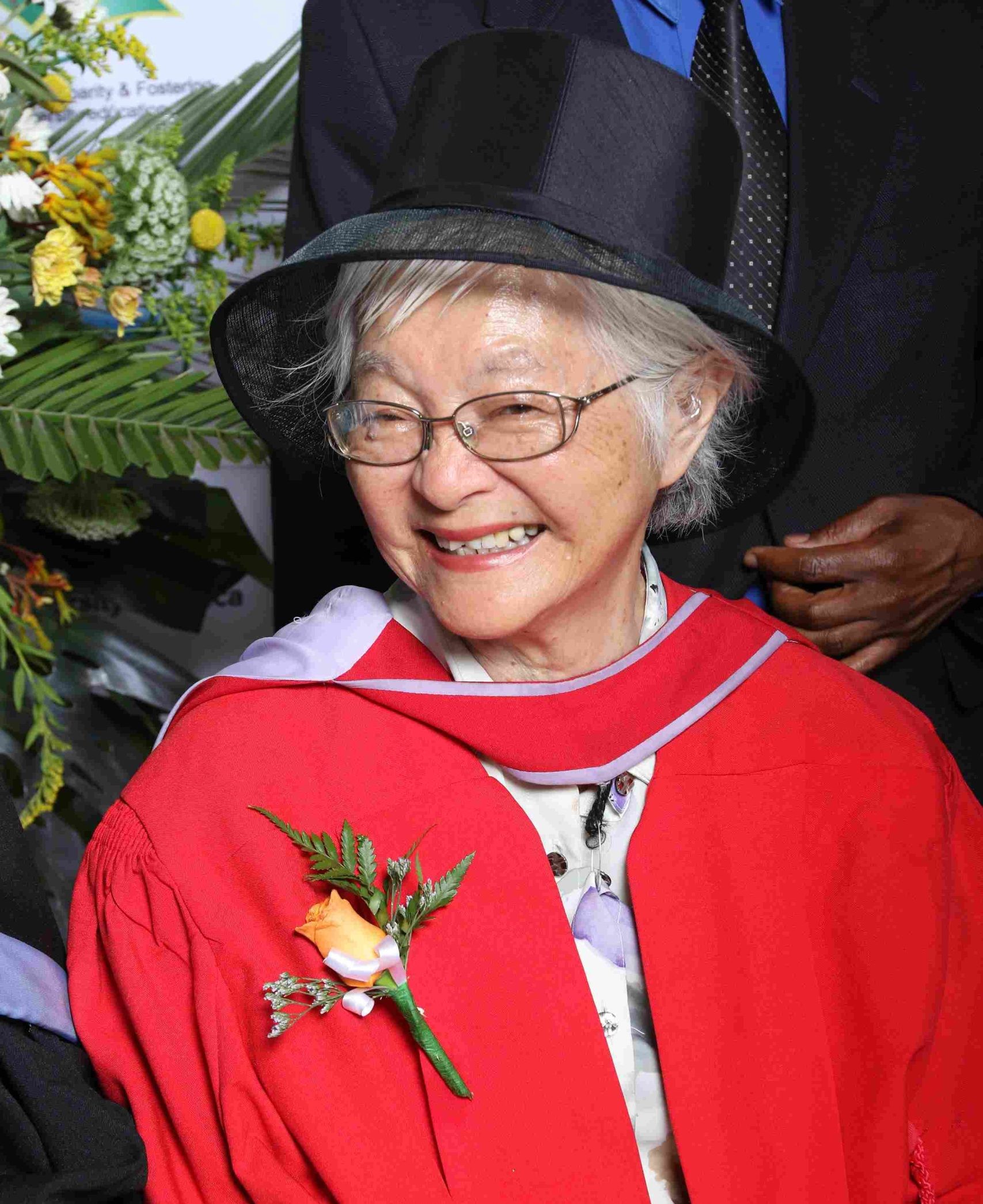
Dr Itai Hlonie Mafa
Dean of the Faculty of Social & Gender Transformative Sciences
Dr Itai Hlonie Mafa is a self-motivated and critical social worker who is enthusiastic about academia, gender issues, social policing, social justice and sexual and reproductive health rights. She has a proven record in social research and has been consulted for research projects in Zimbabwe and South Africa. Dr Mafa is involved in various research committees in the faculty which has sharpened her research skills. She has also accumulated more than ten years of extensive experience in tertiary institutions as a lecturer for various Social Work courses and carrying out post-graduate research supervision. Dr Itai Hlonie Mafa has a well-developed teaching philosophy and a flexible attitude to work, with excellent communication and written skills. Dr Mafa has participated in curricula development and curricula review in Zimbabwe and South Africa, contributing to quality assurance. She is the current NASW-Z treasurer, a thought leader for ZIMCHE and was also involved in consolidating MBKs.
Published articles
Mukurazhizha, R and Mafa, I. (2022). Flaws in preparing children with disabilities for life after Institutional Care in Zimbabwe: Implications for Social Work Practice. Journal of Social Development in Africa, 37
Chisango, T., Mafa I., & Maunganidze, L. (2022). Investigating the sexist implications of Bride Price (Lobola) in Zimbabwe. Society doi:10.1007/s12115-022-00743-7
Chigangaidze, R., Mafa, I., Simango, T and Mudewe, E. (2022). Establishing the relevance of the Ubuntu philosophy in Social work Practice: Inspired by the Ubuntu World Social Work Month 2021 Celebration and the IFSW (2014) global definition of Social work. International Social work:Doi:10.1177/00208728221078374
Chatukuta, A and Mafa, I. (2022). The significance of the clinical social workers’ dress in the helping process: The clients’ perceptions. Practice: Doi:10.1080/09503153.2022.2035706
Simango, T.G and Mafa, I. (2022). Child Disciplinary Practices versus Child Rights in Zimbabwe: Viewed through Social Work Lenses Qualitative Sociological Review 18 (1) 114-131 DOI: https://doi.org/10.18778/1733-8077.18.1.06
Charamba, S., Mafa, I and Chikadzi, V. (2021). ‘In the eye of the storm’: An exploration of the psychosocial experiences of teen mothers in Zimbabwe. Indian Journal of Social Work (82) 12
Mafa, I., Simango, T. and Chisango, T. (2021). Under-Reportage of ‘Sex-For-Marks’ Cases within Public Universities in Zimbabwe. Sexuality, Gender and Policy Doi:10.1002/SGP2.12038
Mafa, I and Simango, T.G. (2021). Exploring the ‘Thigh-For-Marks’ Phenomenon among Public Universities in Zimbabwe. Journal of Human Rights and Social Work https:/doi.org/10.1007/s41134-021-00188-8
Chisango, T., Muridzo, N., Mafa, I and Khombo, S. (2021). An exploration of the stereotype content model to university lectures. Journal of Applied Social Sciences https:/doi.org/10.1177/19367244211026915
Mafa, I. (2021). Pertinent ills concomitant with matrifocality in Zimbabwe: Implications for development. Innovare Journal of Social Sciences, 9 (2):10-15
Muridzo, N, Chikadzi, V., Mahunste S and Mafa, I. (2021). Legal shortcomings in the VFS forums responding to child sexual abuse: Lessons from a Zimbabwean case study. African Journal of Social Work 11(1): 32-39
Mafa, I., Kange’the S. and Chikadzi, V. (2020). ‘Revenge Pornography’ and Women Issues: Implications for Social Work Practice and Women’s Rights. Journal of Human Rights and Social Work, 5 (1) : 118-128 https://doi:10.1007/s41134-020-00118-0
Mahuntshe, L., Muridzo, N., Chikadzi, V and Mafa, I. (2020). Responding to the COVID-19 pandemic in Zimbabwe: Lessons from 2018 Cholera outbreak. Journal of Social Development in Africa, 35 (Special Issue): 91-106
Mafa, I and Kange’the, S. (2019).Women-NGOs and Financial Viability: Implications for Women Empowerment Processes from a Social Work Perspective. African Journal of Social Work, 9(2):43-51
Muridzo, N., Chikadzi, V., Mafa, I and Chinyenze, P. (2018). Parental Circumstances leading to Child Sexual Abuse in Zimbabwe. Journal of Social Development in Africa, 33(2):135-168
Mafa, I and Kange’the S.M. (2016). Exploring the Underpinnings of Pseudo-Prostitution in Institutions of Higher Learning in selected African countries. Journal of Sociology and Anthropology, 7(3):167-174
Mafa, I & Kange’the S.M. (2016). A critical Analysis of the prostitution phenomenon, drawing examples from selected African countries: A Literature Review. Journal of Sociology and Anthropology, 7(4):279-288
Kange’the S.M and Mafa I. (2014). Evaluating the survival strategies adopted by single mothers to enhance their livelihood in Zimbabwe. Mediterranean Journal, 5 (2): 1222-1229
Kange’the S.M and Mafa I. (2014). Dynamics associated with the state of cohabitation in developing countries. A literature Review. Mediterranean Journal, 5(4):601-609
Kange’the S.M and Mafa I. (2014). Assessing Post-Apartheid Poverty in South Africa. A literature Review. Mediterranean Journal, 5(1):449-456
Kange’the S.M and Mafa I. (2014). Dynamics associated with matrifocality in Zimbabwe. Journal of Sociology and Anthropology, 5(2):131-139
Published Book Chapter (s)
Mudewe, E., Simango, T., Mafa, I and Chingangaidze, R. (2022). Demystifying the National Case Management System in Child protection. In Professional Social Work in Zimbabwe: Putting Children First. Beyond the Vale Publishing: Edenvale, South Africa
Published Book (s)
Mafa, I. (2020). Identity and Identity Crisis: A Practical Guide to Finding Your True Self. Kindle Direct Publishing
Driving Social Change and Empowering Women
The Faculty of Social and Gender Transformative Sciences at the Women's University is at the forefront of addressing critical social issues and empowering students to become agents of change. We offer a range of programs that equip students with the knowledge, skills, and values to create a more just and equitable society.
Why Choose Us?
Explore Our Programs:
Certificate:
Our Diplomas:
Undergraduate Programmes:
Postgraduate Degree:
Women’s University © 2024

Trustee & Co-Founder
She is the Founder and Founding Vice Chancellor of the Women’s University in Africa. She holds a PhD in Public administration with the University of Zimbabwe where her research was on “Critical Organisational problems of administering and Managing Social Development in a newly-independent Public Service”: the case of Zimbabwe. She also holds a Masters degree in Public Administration with the University of Missouri, Columbia and BSc Public Administration with the same university. She holds a Primary Teachers Diploma with Waddilove Teachers’ College, Marondera in Zimbabwe.
Professor Sadza’s employment record backdates to 1964 as school teacher. Post Independence she became registrar of Apprenticeship Authority in the Ministry of Manpower Planning and Development in Zimbabwe. She is one of the founding Directors of the Zimbabwe Institute of Public Administration & Management (ZIPAM).In 1987 to 1989 she was Commissioner of the Public Service Review Commission, Government of Zimbabwe. In 1988 to 1990 she was Zimbabwe Parastatals Commissioner. In 1990 to 2000 she was Public Service Commissioner in Zimbabwe.
Professor Sadza has done a lot of publications with emphasis on gender issues.
She has presented papers at national and international fora among which were:
Professor Sadza is a member of various Boards among them:
CURRENT
COMMITTEES/TRUSTS
She is also into consultancy mostly in the education field.
She has won several awards in recognition of her outstanding works of empowering women through education.
Awards:
Professor Sadza is married and has two children.

Chairperson & Co-Founder
Dr Fay Chung is co- founder and Chairperson Board of Trustees for Women’s University in Africa. A former Minister of Education Sports and Culture Dr Chung has been involved in a number of non-governmental organizations in Zimbabwe. An accomplished educationist and driver of women education, Dr Fay Chung has worked in the education system in a number of capacities. Dr Chung is a founder member of the Forum for African Women Educationalist and Association for Strengthening Higher Education for Women in Africa Dr Chung has been instrumental in the education of women in Africa. Dr Chung has worked in a number of international organizations which include UNESCO, UNICEF, OAU and AU. Dr Chung has several publications to her name which include the popular Re-Living the Second Chimurenga: Memories form Zimbabwe’s Liberation Struggle and The Nordic Africa Institute amongst others.
She was educated at the University of Zimbabwe, where she received her first degree (1962), her postgraduate Certificate in Education (1965) and her Doctorate (1999).
She also studied at Leeds University, where she obtained her M. Phil. In English Literature (1971) and has undertaken research at St Antony’s College, Oxford (1995). She diversified into economics and completed a distance-education degree at the School of Oriental and African Studies, London in 2002. Following retirement she enrolled in an honours degree program in Economic at the University of Zimbabwe.
Dr Chung’s career has been almost exclusively in education. As an undergraduate she was involved in organising students to teach house servants and workers in the vicinity of the campus. One of the tasks was to eradicate illiteracy. She has always had a vision to provide leadership in Africa through access to relevant quality tertiary education.
From 1963 to 1968 Dr Chung taught at high schools levels at Ascot and Harare High Schools in Zimbabwe. While studying for her M. Phil. Degree at Leeds University, she taught as a part-time lecturer at Leeds Polytechnic and at the Kitson College of Engineering from October 1968 to June 1970. She was a lecturer in the School of Education at the University of Zambia from 1971 to 1975. From 1975 to 1980 she worked fulltime for the Zimbabwe African National Union (ZANU), in charge of teacher education and curriculum development for Zimbabwean refugees schools in Mozambique.
After Zimbabwe’s independence in 1980, Dr Chung worked in various capacities in the Ministry of Education, including as the first acting director for the Zimbabwe Integrated National Teacher Education Course (ZINTEC), which was initiated at independence to train 9,000 primary teachers through a combination of face-to-face teaching and distance education; as head of educational planning in the ministry, with responsibility for planning the expansion for the primary, secondary and teacher training programs; as head of the curriculum development unit, tasked with transforming the curricula for primary and secondary schools; as deputy secretary in charge of school administration; and finally as minister of Education and Culture. She spent a total of 14 years in the government of Zimbabwe.
Dr Chung has been involved in a number of non-governmental organisations. She took part in the formation of the Zimbabwe Foundation for Education with Production (ZIMFEP), set up to provide education for war veterans and returning refugee children from Mozambique and Zambia. School leavers were assisted through placement in further training and in jobs, or through the establishment of cooperatives.
She has been a board member of the Zimbabwe Institute of Development Studies (ZIDS). She is a founder member of the Forum for African Women Educationalists (FAEW), a network of education ministers, women university vice-chancellors and other women educational leaders in Africa, focused on strengthening the education of girls and women in Africa. Dr Chung is the founder member of the Association for Strengthening Higher Education for Women in Africa (ASHEWA).
Dr Chung’s work has an international dimension. She was a member of the Delors Commission Education and worked as the chief of the education cluster at UNICEF, New York (1993-98), then as the first director of the UNESCO International Institute for Capacity Building in Africa (IICBA) in Addis Ababa (1998-2003). Between 1998 and 2003 she served as an honorary special advisor to the Organisation of African Union (OAU) and later to the African Union (AU).
Dr Chung is a member of the Zimbabwe National Education Advisory Board as of 18 March 2009.
Publications
Chung Fay, ‘Re-Living the Second Chimurenga: Memories from Zimbabwe’s Liberation Struggle,’ The Nordic Africa Institute, Weaver Press 2006